想要报考2021年的ACCA,需要准备哪些材料?
发布时间:2019-12-28
无论是在职人员,或是财会和非财会专业大学生只要满足16周岁都是可以报考ACCA的,不过所需要的报名材料却不大相同。今天51题库考试学习网就给大家介绍一下,不同的人群应该准备哪些不同的报名材料。
在校学员所需准备的注册资料:
中英文在读证明,中英文在校期间各年级成绩单,中英文个人身份证件或护照,2寸彩色证件照一张,注册报名费 。
非在校学员所需准备的注册资料:
中英文个人身份证件或护照
,中英文学历证明,2寸彩色证件照一张。
不具备以上条件的,可通过FIA途径注册ACCA。
需要注意的是ACCA学员注册报考和缴纳ACCA考试费用都是在全球英文官网中完成的,因此,对于英语能力并不是很好的同学来讲很可能有些难度。今天就给计划参加ACCA考试的学员提供以下注册报考和缴费的具体步骤:
1、 登陆ACCA官网,然后进入MY ACCA;
2、 在登录界面输入ACCA注册号以及密码;
3、 登陆到MY
ACCA之后点击进入左边的EXAM ENTRY;
4、 点击“EXAM
ENTRY”后出现的是考试费情况,点击Enter for Exams ;
5、 选择考试季,点击下拉框选择考试季,显示如下点击“Apply for Exam session”;
6、 选择ACCA考试科目,在select exam下面的方框打钩,exam type选择“computer based“or”paper
based“,没有选项的默认为paper based,选择考试国家和地点,然后点击“next”;
7、 再次确认考试信息和支付金额,如果有欠费,或是年费,在my ACCA account balance due后面会显示金额;
8、 在方框处打钩,点击“proceed to payment”;
9、 选择支付方式,支付宝or信用卡选择信用卡,填写Card Number、Card Holder Name、Card expiry Date、CVC、点击“next“。
以上信息则是不同身份的报考人员所需要准备的材料,想了解更多的话,可以在51题库考试学习网上留言咨询!
下面小编为大家准备了 ACCA考试 的相关考题,供大家学习参考。
(b) Describe the principal matters that should be included in your firm’s submission to provide internal audit
services to RBG. (10 marks)
(b) Principal matters to be included in submission to provide internal audit services
■ Introduction/background – details about York including its organisation (of functions), offices (locations) and number of
internal auditors working within each office. The office that would be responsible for managing the contract should be
stated.
■ A description of York’s services most relevant to RBG’s needs (e.g. in the areas of risk management, IT audits, value for
money (VFM) and corporate governance).
■ Client-specific issues identified. For example, revenue audits will be required routinely for control purposes and to
substantiate the contingent rents due. Other areas of expertise that RBG may be interested in taking advantage of, for
example, special projects such as acquisitions and mergers.
■ York’s approach to assessing audit needs including the key stages and who will be involved. For example:
(1) Preliminary – review of business, industry and the entity’s operating characteristics
(2) Planning – including needs analysis and co-ordination with external audit plan
(3) Post-Audit – assurance that activities were effectively and efficiently executed
(4) Review – of services provided, reports issued and management’s responses.
■ A description of internal audit tools used and methodologies/approach to audit fieldwork including use of embedded
audit software and programs developed by York.
■ A description of York’s systems-based audit, the IT issues to be addressed and the technological support that can be
provided.
■ Any training that will be offered to RBG’s managers and staff, for example, in a risk management approach.
■ A description and quantity of resources, in particular the number of full-time staff, to be deployed in providing services
to RBG. An outline of RBG’s track record in human resource retention and development.
■ Relevant experience – e.g. in internal and external audit in the retail industry. The relative qualifications and skills of
each grade of audit staff and the contract manager in particular.
■ Insurance certifications covering, for example, public liability and professional indemnity insurance.
■ Work ethic policies relating to health and safety, equal opportunities’ and race relations.
■ How York ensures quality throughout the internal audit process including standards to be followed (e.g. Institute of
Internal Auditors’ standards).
■ Sample report templates – e.g. for reporting the results of risk analysis, audit plans and quarterly reporting of findings
to the Audit and Risk Management Committee.
■ Current clients to whom internal audit services are provided from whom RBG will be able to take up references, by
arrangement, if York is short-listed.
■ Any work currently carried out/competed for that could cause a conflict of interest (and the measures to avoid such
conflicts).
■ Fees (daily rates) for each grade of staff and travel and other expenses to be reimbursed. An indication of price increases,
if any, over the three-year contract period. Invoicing terms (e.g. on presentation of reports) and payment terms (e.g. the
end of the month following receipt of the invoice).
■ Performance targets to be met such as deadlines for completing work and submitting and issuing reports.
(b) Explain how the non-payment of contributions and the change in the pension benefits should be treated in
the financial statements of Savage for the year ended 31 October 2005. (4 marks)
(b) The contributions payable by Savage to the trustees will not count as an asset for the purposes of the valuation of the fund.
IAS19 (paragraph 103) states that plan assets should not include unpaid contributions due from the reporting entity to the
fund. Thus in the financial statements of Savage the contributions would be shown as an amount payable to the trustees
and there may be legal repercussions if the amount is not paid within a short period of time. Following the introduction of
changes to a defined benefit plan, a company should recognise immediately past service costs where the benefit has vested.
In the case where the benefits have not vested then the past service costs will be recognised as an expense over the averageperiod until the benefits vest. The company will therefore recognise $125 million at 1 November 2004.
(b) Prepare a consolidated statement of financial position of the Ribby Group at 31 May 2008 in accordance
with International Financial Reporting Standards. (35 marks)

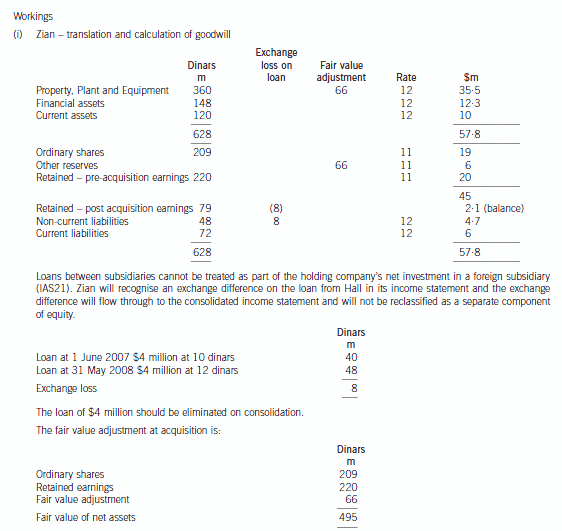


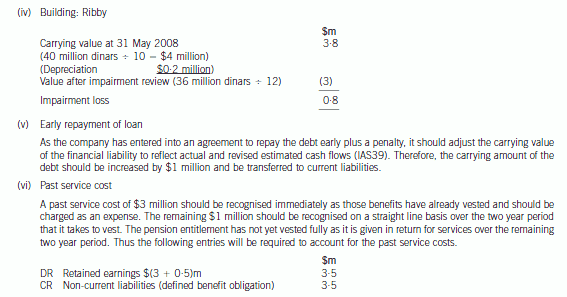
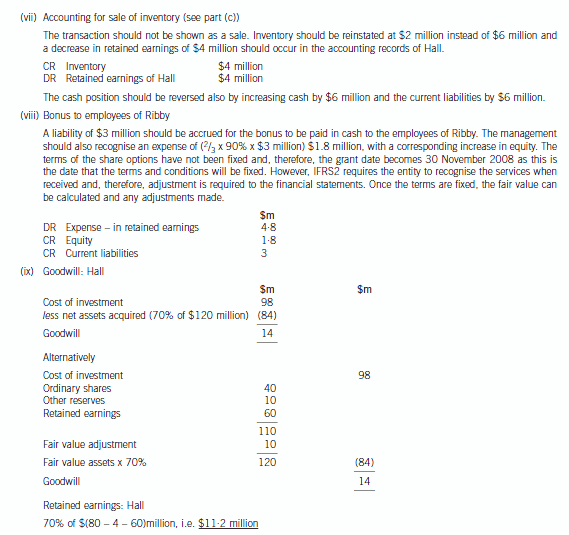
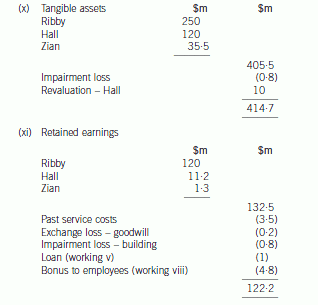
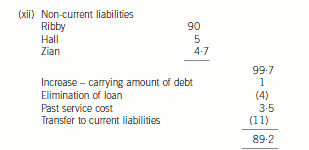
(c) Explanatory notes, together with relevant supporting calculations, in connection with the loan. (8 marks)
Additional marks will be awarded for the appropriateness of the format and presentation of the schedules, the
effectiveness with which the information is communicated and the extent to which the schedules are structured in
a logical manner. (3 marks)
Notes: – you should assume that the tax rates and allowances for the tax year 2006/07 and for the financial year
to 31 March 2007 apply throughout the question.
– you should ignore value added tax (VAT).
(c) Tax implications of there being a loan from Flores Ltd to Banda
Flores Ltd should have paid tax to HMRC equal to 25% of the loan, i.e. £5,250. The tax should have been paid on the
company’s normal due date for corporation tax in respect of the accounting period in which the loan was made, i.e. 1 April
following the end of the accounting period.
The tax is due because Flores Ltd is a close company that has made a loan to a participator and that loan is not in the ordinary
course of the company’s business.
HMRC will repay the tax when the loan is either repaid or written off.
Flores Ltd should have included the loan on Banda’s Form. P11D in order to report it to HMRC.
Banda should have paid income tax on an annual benefit equal to 5% of the amount of loan outstanding during each tax
year. Accordingly, for each full year for which the loan was outstanding, Banda should have paid income tax of £231
(£21,000 x 5% x 22%).
Interest and penalties may be charged in respect of the tax underpaid by both Flores Ltd and Banda and in respect of the
incorrect returns made to HMRC
Willingness to act for Banda
We would not wish to be associated with a client who has engaged in deliberate tax evasion as this poses a threat to the
fundamental principles of integrity and professional behaviour. Accordingly, we should refuse to act for Banda unless she is
willing to disclose the details regarding the loan to HMRC and pay the ensuing tax liabilities. Even if full disclosure is made,
we should consider whether the loan was deliberately hidden from HMRC or Banda’s previous tax adviser.
In addition, companies are prohibited from making loans to directors under the Companies Act. We should advise Banda to
seek legal advice on her own position and that of Flores Ltd.
声明:本文内容由互联网用户自发贡献自行上传,本网站不拥有所有权,未作人工编辑处理,也不承担相关法律责任。如果您发现有涉嫌版权的内容,欢迎发送邮件至:contact@51tk.com 进行举报,并提供相关证据,工作人员会在5个工作日内联系你,一经查实,本站将立刻删除涉嫌侵权内容。
- 2020-01-09
- 2020-01-09
- 2020-07-04
- 2020-01-10
- 2020-01-10
- 2020-03-06
- 2020-01-08
- 2020-12-31
- 2020-01-09
- 2020-05-20
- 2020-01-02
- 2020-07-04
- 2020-02-27
- 2020-01-03
- 2020-03-26
- 2020-01-09
- 2021-04-04
- 2020-07-15
- 2020-01-10
- 2020-01-10
- 2020-08-13
- 2020-01-10
- 2020-01-08
- 2020-12-31
- 2020-01-09
- 2020-05-20
- 2020-01-10
- 2020-09-03
- 2020-01-08
- 2020-01-09